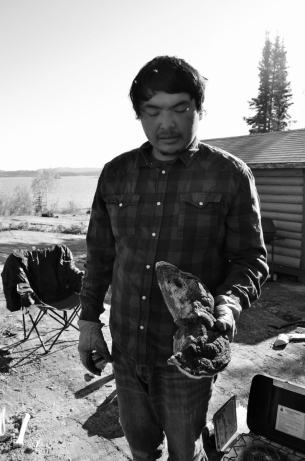
Mason Mantla is a Tłı̨chǫ Dene from Behchokǫ̀ and the Chair of the Wek’èezhìi Land and Water Board. Since joining the Board over a decade ago, he has helped manage some of the largest mining projects in the Northwest Territories, setting enforceable boundaries for the corporations that own them and ensuring their work meets the highest environmental standards. He has overseen major mine closure plans, guided complex environmental assessments, and strengthened the integration of Traditional Knowledge and Western science in regulatory decisions.
As Chair, Mason works to connect communities and Indigenous governments with territorial and federal regulators to ensure all voices are heard when major decisions are made. “The work that we do is important because at the end of the day our priority is safety for the residents that we serve. We have to make sure that when these corporations come onto our land, that they leave it in a suitable way that doesn't affect our future generations,” he explains.
“And I think that we have to ensure that the land and water is as pristine as we can make it be and safe for future generations.”
Mason’s commitment is rooted in lived connection to the land: “At the end of the day, the people are still here: the Dene people are still here, the Northwest Territories people still here. We're still part of the land, we still use the land, so we have to make sure that it's all there for them.”
Beyond his role with the WLWB, Mason is a published writer, award-winning filmmaker, comedian, and safety professional. His short story “Reverse Don’t Work” will be published in The Malahat Review’s special Indigenous storytelling issue (#233, Winter 2025), guest-edited by Richard Van Camp. His lyrical-poetic piece “We Sing: A Song for our Families Who Experienced Residential School” was published in Pimatisiwin: A Journal of Aboriginal and Indigenous Community Health (2010), and he co-authored the peer-reviewed Evaluation of the Kǫts’iìhtła (“We Light the Fire”) Project in the International Journal of Circumpolar Health (2015).
As a filmmaker, Mason’s work includes the award-winning short film Fireweed (Dead North Film Festival, Reykjavík International Film Festival, ImagineNATIVE) and the upcoming project Nahga, supported by Bell Media’s Harold Greenberg Fund. He has performed stand-up comedy on the Just for Laughs tour stop in Yellowknife and is known for weaving Northern and Indigenous life into sharp, observational storytelling. In his safety career, Mason works with Forward Mining on the Giant Mine Remediation Project, contributing to hazard recognition programs, worker training, and safety culture development.